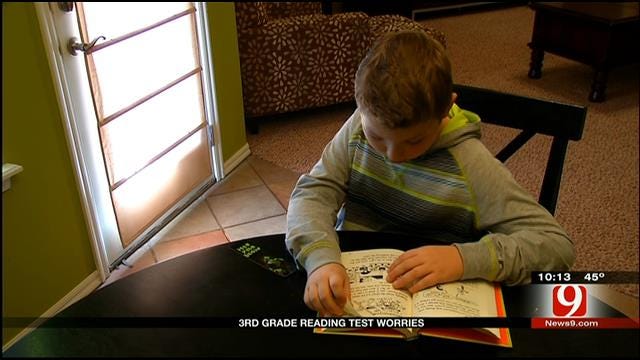Oklahoma 3rd Graders Worried About Reading Sufficiency Act Exam
Heidi McComb's 9 year old son Zane has always loved school. Something changed for this straight-A student soon after he started 3rd grade.Thursday, February 13th 2014, 10:52 pm
Heidi McComb's 9 year old son Zane has always loved school. Something changed for this straight-A student soon after he started 3rd grade.
"He started complaining about stomach aches every morning and not wanting to go to school," Heidi said. "My husband would drop him off and he would start to cry."
Concerned for her son, it finally clicked.
Heidi asked her son, "'Are you worried about not passing the 3rd grade?' He's one of those kids who worry. A little tear just kind of came down his eye and he shook his head, 'Yes.'"
Under the Reading Sufficiency Act, every 3rd grader in Oklahoma public schools will take a reading test in April. If they don't pass, they don't go onto the 4th grade. The thought of it makes Zane nervous he won't pass.
Heidi said, "Quite frankly, it angered me. Here the bully in my child's life is the school system. Threatening him, scaring him to think he's not going to go to the next grade."
The Oklahoma State Department of Education said about 36% of third graders read below grade level and aren't prepared to go onto 4th grade. State superintendent Janet Barresi said something has to change.
"Children stop learning how to read and start reading to learn in 4th grade," Barresi said. "We've got to have them ready for that critical 4th grade or they're going to continue to fall further behind."
Barresi believes the Reading Sufficiency Act is giving students a leg up on learning.
Barresi said, "If you get a date certain that something has to be achieved, districts are beginning to organize themselves around this and really focusing on effective instruction and doing what is needed for each child."
Dr. Paulette Shreck, long time UCO Early Childhood Education Professor, disagrees with the new law.
"Sometimes I worry we're testing more than instructing," said Shreck. "Legislation is deciding a child is retained rather than the professional teacher. We never make a major decision that's going to impact a child's life based on one test."
Heidi thinks the work students do all year should dictate whether or not they move on.
"I don't mind that there are standardized tests," Heidi said. "I don't think there should be that stigma on if you don't test well, you don't go onto the next grade."
Barresi says focusing on reading will not only help our children succeed now, but in the future.
"We think we're going to cut high school dropouts, cut enrollment in Special Education, increase literacy in this state and really enable our kids to reach their potential academically," Barresi said.
Districts have a window of opportunity in mid-April to administer the test. Check with your child's school for their test date.
Learn more about the Reading Sufficiency Act implementation guide.
Good-cause exemptions for promotion shall be limited to the following:
1· Limited-English-proficient students who have had less than two years of instruction in an English Language Learner (ELL) program;
2· Students with disabilities whose IEP, consistent with state law, indicates that participation in the statewide criterion-referenced test OAAP is administered;
3· Students who demonstrate an acceptable level of performance on an alternative standardized reading assessment approved by the State Board of Education;
4· Students who demonstrate, through a student portfolio, that the student is reading on grade level as evidenced by demonstration of mastery of the state standards beyond the retention level;
5· Students with disabilities who participate in the statewide criterion-referenced tests and who have an IEP that reflects that the student has received intensive remediation in reading for more than two years but still demonstrates a deficiency in reading and was previously retained in kindergarten, first grade, second grade, or third grade; and
6· Students who have received intensive remediation in reading through an APP for two or more years but still demonstrate a deficiency in reading and who were previously retained in kindergarten, first grade, second grade, or third grade for a total of two years. A student who is promoted as provided for in this paragraph shall be provided intensive reading instruction during an altered instructional day that includes specialized diagnostic information and specific reading strategies for each student. The school district shall assist schools and teachers to implement reading strategies for the promoted students that research has shown to be successful in improving reading among low-performing readers.
Documentation Exemption:
Teacher/Principal/Superintendent
In addition to the good-cause exemptions, requests to exempt students from the academic requirements for promotion to the next grade shall be made upon:
1· Documentation submitted from the teacher of the student to the school principal that indicates that the promotion of the student is appropriate and is based upon the record of the student.
2· The principals review and discussion of the documentation with the teacher. If the principal determines that the student meets the good-cause exemption, the principal shall make a recommendation in writing to the school district superintendent. After review, the school district superintendent shall accept or reject the recommendation of the principal in writing.
More Like This
February 13th, 2014
November 13th, 2024
October 28th, 2024
October 17th, 2024
Top Headlines
January 2nd, 2025
January 2nd, 2025
January 2nd, 2025












